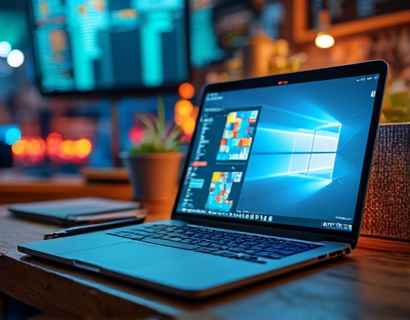Decentralized File Management: Revolutionizing Business Collaboration with a Secure and Efficient Online Platform for Teams
In the rapidly evolving landscape of business collaboration, the need for secure, efficient, and decentralized file management solutions has become paramount. Traditional centralized file management systems often fall short in ensuring the integrity, accessibility, and security of critical business information. This has led to the emergence of innovative online platforms that prioritize decentralization and security, offering a transformative approach to team collaboration. These platforms not only enhance productivity but also streamline information management processes, making them ideal for businesses and teams seeking a robust solution.
The concept of decentralized file management revolves around distributing data across a network of nodes rather than storing it in a single centralized location. This approach offers several advantages, including enhanced security, improved data integrity, and increased resilience against failures. By eliminating the single point of failure inherent in centralized systems, decentralized solutions ensure that critical business information remains accessible and secure, even in the event of a network breach or server downtime.
One of the key benefits of decentralized file management is the significant enhancement in team productivity. With a user-friendly interface, teams can organize and share files seamlessly, reducing the time spent on administrative tasks and allowing more focus on core business activities. The decentralized nature of these platforms means that team members can access files from anywhere, at any time, as long as they have an internet connection. This flexibility is crucial in today's remote and hybrid work environments, where collaboration often transcends geographical boundaries.
Security is another critical aspect that sets decentralized file management platforms apart. Traditional centralized systems are often targets for cyberattacks due to their centralized nature, making them vulnerable to large-scale breaches. In contrast, decentralized platforms distribute data across multiple nodes, making it significantly harder for attackers to compromise the entire system. Additionally, advanced encryption techniques and blockchain technology are employed to ensure that data remains confidential and tamper-proof. This multi-layered security approach provides businesses with peace of mind, knowing that their sensitive information is well-protected.
The implementation of decentralized file management also optimizes collaborative workflows. By providing a centralized yet distributed repository for files and information, these platforms facilitate smoother communication and coordination among team members. Tasks can be assigned, tracked, and completed with greater efficiency, as all relevant documents and updates are easily accessible within the platform. This not only reduces the risk of miscommunication but also ensures that everyone is on the same page, fostering a more cohesive and productive team environment.
For businesses and teams looking to adopt a decentralized file management solution, there are several key features to consider. First, the platform should offer a intuitive and user-friendly interface that simplifies file organization and sharing. This includes features such as drag-and-drop functionality, hierarchical folder structures, and advanced search capabilities. A well-designed interface ensures that users can navigate the platform with ease, minimizing the learning curve and maximizing productivity.
Another essential feature is robust access control and permission management. Decentralized platforms should allow administrators to set granular permissions for different users or groups, ensuring that sensitive information is only accessible to authorized personnel. This level of control is crucial for maintaining data security and compliance with industry regulations. Additionally, real-time tracking and audit logs can provide valuable insights into who accessed what files and when, further enhancing accountability and transparency.
Scalability is also a critical consideration when choosing a decentralized file management solution. As businesses grow and evolve, their file management needs will change accordingly. A scalable platform can accommodate increasing amounts of data and users without compromising performance. This ensures that the solution remains effective and efficient, even as the organization expands.
The integration capabilities of a decentralized file management platform are another important factor. The ability to seamlessly integrate with existing tools and systems, such as project management software, CRM systems, and communication platforms, can significantly enhance the overall workflow. This interoperability ensures that the new solution fits seamlessly into the existing tech ecosystem, avoiding the need for costly and time-consuming overhauls.
In terms of technology, decentralized file management platforms often leverage cutting-edge technologies such as blockchain, distributed ledger technology, and peer-to-peer networking. These technologies provide the foundation for a secure, transparent, and efficient file management system. Blockchain, for instance, ensures that all transactions and data modifications are recorded in a tamper-proof manner, providing an immutable audit trail. Peer-to-peer networking allows for direct file sharing between users, reducing the load on central servers and improving overall performance.
The adoption of decentralized file management is not without its challenges, however. One of the primary concerns is the initial setup and migration of existing files to the new platform. This process can be complex and time-consuming, requiring careful planning and execution. Businesses must also consider the training and support needed to ensure that all users are comfortable using the new system. Despite these challenges, the long-term benefits of enhanced security, efficiency, and collaboration make the transition well worth the effort.
Another consideration is the regulatory compliance aspect. Depending on the industry and region, businesses may be subject to strict data protection and privacy laws. Decentralized file management platforms must be designed to comply with these regulations, ensuring that data is handled and stored in accordance with legal requirements. This includes features such as data localization, where data is stored within specific geographic boundaries, and compliance reporting tools.
Case studies and real-world examples can provide valuable insights into the practical applications and benefits of decentralized file management. For instance, a large multinational corporation might implement a decentralized platform to manage files across different departments and locations. By doing so, they can ensure that all team members have secure and timely access to critical documents, regardless of their physical location. This not only streamlines internal processes but also enhances collaboration with external partners and clients.
A mid-sized software development company could leverage a decentralized file management solution to facilitate agile development practices. With a centralized repository for code repositories, project documentation, and asset management, the team can work more efficiently, reducing the time spent on file searches and version control issues. This leads to faster development cycles and higher quality products.
In the healthcare industry, where data security and patient privacy are paramount, a decentralized file management system can provide a robust solution for managing medical records and research data. By ensuring that sensitive patient information is encrypted and distributed across multiple nodes, healthcare providers can maintain compliance with regulations such as HIPAA while improving access and collaboration among medical professionals.
In conclusion, decentralized file management represents a significant leap forward in business collaboration, offering a secure, efficient, and user-friendly alternative to traditional centralized systems. By embracing this innovative approach, businesses and teams can enhance productivity, streamline workflows, and protect their critical information with greater confidence. As the demand for secure and efficient file management continues to grow, decentralized platforms are poised to become an essential tool for organizations of all sizes and industries.











































